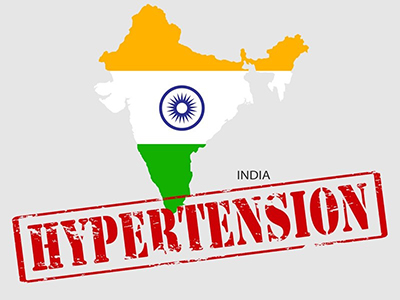Relevance: GS-2: Issues relating to the development and management of Social Sector/Services relating to Education and Health.
Key Phrases: India Hypertension Control Initiative, Blood Pressure, Health Ministry, Indian Council of Medical Research, WHO-India, 25 by 25 goal, Non-Communicable Diseases.
Why in News?
- A project called the India Hypertension Control Initiative (IHCI) finds that nearly 23% out of 2.1 million Indians have uncontrolled blood pressure.
What is the India Hypertension Control Initiative?
- Recognising that hypertension is a serious, and growing, health issue in India, the Health Ministry, the Indian Council of Medical Research, State Governments, and WHO-India began a five-year initiative to monitor and treat hypertension.
- India has committed to a "25 by 25" goal, which aims to reduce premature mortality due to non-communicable diseases (NCDs) by 25% by 2025. One of the nine voluntary targets includes reducing the prevalence of high blood pressure by 25% by 2025.
- The programme was launched in November 2017. In the first year, IHCI covered 26 districts across five States — Punjab, Kerala, Madhya Pradesh, Telangana, and Maharashtra. By December 2020, IHCI was expanded to 52 districts across ten States.
-
Hypertension is defined as having a systolic blood pressure level greater than or equal to 140 mmHg or a diastolic blood pressure level greater than or equal to 90 mmHg or/and taking anti-hypertensive medication to lower his/her blood pressure.
-
High blood pressure (hypertension) is a common condition in which the long-term force of the blood against your artery walls is high enough that it may eventually cause health problems, such as heart disease.
-
Hypertension is a serious medical condition that significantly increases the risks of heart, brain, kidney and other diseases.
What has the India Hypertension Control Initiative found so far?
- Its most important discovery so far is that nearly one-fourth of (23%) patients under the programme had uncontrolled blood pressure, and 27% did not return for a follow-up in the first quarter of 2021. There were an estimated 20 crore adults with hypertension in the country.
- To achieve India’s target of a 25% relative reduction in the prevalence of raised blood pressure, approximately 4.5 crore additional people with hypertension need to get their blood pressure under control by 2025.
- Nearly half (47%) of the registered patients under care had blood pressure under control during the most recent visit in the first quarter of 2021. Drug availability improved in all phase I States with at least one-month refills for key blood pressure drugs.
- There weren’t enough validated high-quality digital blood pressure monitors in several health facilities, which affected the accuracy of hypertension diagnosis. In phase I States, dedicated nurses were insufficient except in Telangana and Maharashtra. In phase II States, most districts did not have dedicated NCD nurses at public health care centre level except Chennai.
How prevalent is the problem of hypertension?
- Southern States have a higher prevalence of hypertension than the national average, according to the latest edition of the National Family Health Survey. While 21.3% of women and 24% of men aged above 15 have hypertension in the country, the prevalence is the highest in Kerala where 32.8% of men and 30.9% of women have been diagnosed with hypertension.
- Kerala is followed by Telangana where the prevalence is 31.4% in men and 26.1% in women.
- About one-fourth of women and men aged 40 to 49 years have hypertension. Even at an earlier age, one in eight women and more than one in five men aged 30 to 39 years have hypertension. The prevalence of hypertension is higher among Sikhs (37% for men and 31% for women), Jains (30% for men and 25% for women), and Christians (29% for men and 26% for women) than the rest.
How can the burden of hypertension be reduced?
- Reducing hypertension prevents heart attack, stroke, and kidney damage, as well as other health problems.
- Prevention of hypertension
- Reducing salt intake (to less than 5g daily).
- Eating more fruit and vegetables.
- Being physically active on a regular basis.
- Avoiding the use of tobacco.
- Reducing alcohol consumption.
- Limiting the intake of foods high in saturated fats.
- Eliminating/reducing trans fats in the diet.
- Management of hypertension
- Reducing and managing stress.
- Regularly checking blood pressure.
- Treating high blood pressure.
- Managing other medical conditions.
Source: The Hindu
Mains Question:
Q. Discuss the role of the India Hypertension Control Initiative in eliminating the hypertension from India? Comment (250 works).








